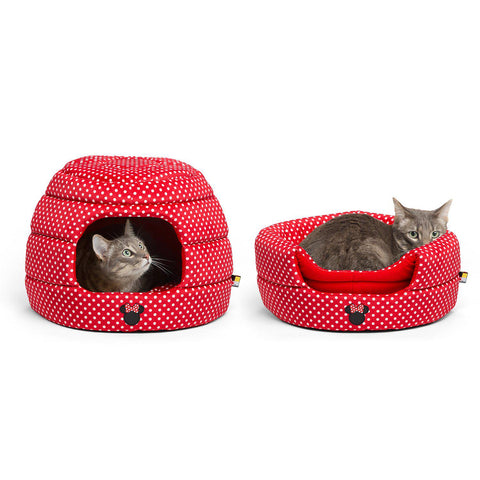Why Do Cats Hide?
Cats and small spaces go together like peanut butter and jelly. Why do cats hide in small spaces so often? Ultimately, because it makes them feel safe. Cats hide because their chosen hiding spot gives them a sense of security being out in the open can't.
But don't worry -- hiding is a totally natural cat behavior! It's also why cats love boxes so much. Ever catch your cat hiding in a shoe box or an open cardboard box from the last mail drop? Your cat's hiding in there because it offers a sense of security and comfort.
Let's look more into your cat's hiding behavior and what cat owners can do to create safe spaces away from stressors for their furbaby.
Cat Behavior: Why do cats like small spaces?

Small, dark spaces are also your furry friend's favorite hiding places because of your cat's natural hunting instincts. Again, this is typical feline behavior. In addition to being safe places to rest, small spaces are ideal for stalking prey.
Cats love to watch a mouse from a distance where they can't see them. Then, when they least expect it -- POUNCE -- and they're gone.
Small, tight spaces are ideal for hiding from predators or other potential threats as well. Say your cat is afraid of certain loud noises and retreats to their little cat cave. Your cat's hiding spot will make them feel protected from the threat or stressor. And if the enclosed space is small enough, your cat can snuggle and curl up to get warm from their body heat.
When your cat's behavior is off
Though cat hiding behavior is totally normal, there are some occasions where it could mean she has health issues. If your cat's hiding is out of character, PetMD recommends monitoring their drinking and eating habits as well as lack of interest in food could be a sign of a medical issue.
Monitor their urinating and defecating habits as well. Check the litter box to evaluate if their stools look healthy. If anything is off, make an appointment with your veterinarian.
Cat Care: Providing a safe space for your kitty

Whether you have an older cat or a new cat, all kitties need a safe place to call their own. This is especially true if you are moving to a new home with your pet.
If you want the best for your little hider, providing a safe space in their current or new environment contributes to their overall wellness. Ohio State University's College of Veterinary Medicine stresses the importance of providing a "refuge" for your cat:
"The refuge is a place your cat can retreat to when she needs quiet time alone. Your cat should be able to come and go freely from her refuge."
Keep a bowl of water handy in your cat's refuge as well as a calming pet bed. Put a soft blanket in the cat carrier when traveling. Pet huts and cat caves are even better. A pet hut is a perfect hideaway that gives your hider complete coverage, privacy, and security.
Choosing a cat bed or cat cave

An optimal hiding spot for your kitty provides warmth, security, and comfort. Our cat cave beds provide 360-degree coverage for your feline friend! With a special hiding space shelter all its own, your cat can enjoy privacy and a little alone time. Feeling warm and protected, snuggling in a cat cave bed can help reduce stress, boosting health and well-being.
Your cat loves those purr-fect small spots

Whether you are moving to a new home or simply moving furniture, keep your pet's wellbeing in mind. These are stressful events for animals and they will need safe, confined spaces or nooks to hide until the activity subsides.
Don't forget to provide your cat with plenty of enrichment whether via food puzzles, cat trees, or scratchers to keep them from boredom or from displaying destructive behaviors.
Again, if you are concerned about your domestic cat spending so much time in small places or tiny spaces, talk to a veterinarian.


